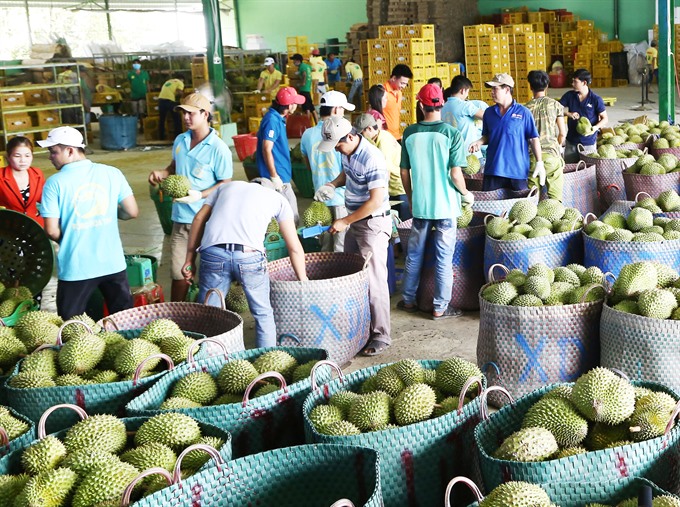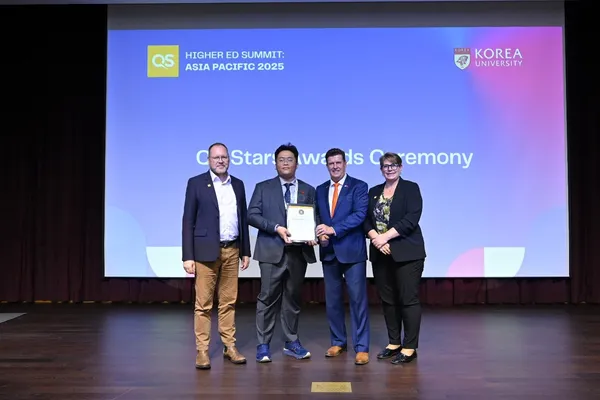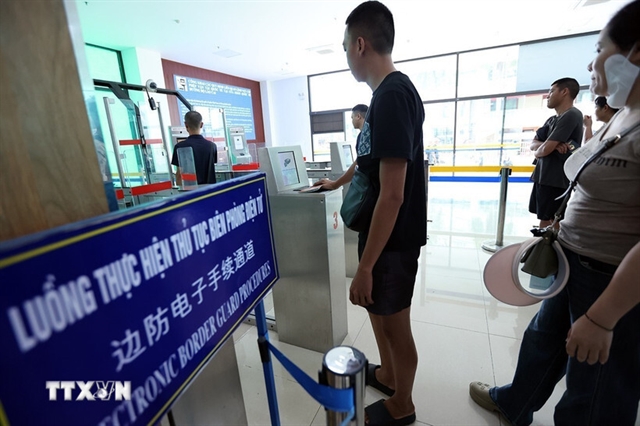.jpg) Economy
Economy
.jpg)
Ministers from Greater Mekong Subregion (GMS)’s six member countries sat down at a conference yesterday to discuss the endorsement and implementation of a five year action plan, towards regional achievements of inclusive growth and sustainable development.
 |
| Durian ready for export in Tiền Giang Province. — VNA/VNS Photo Nam Thái |
HÀ NỘI — Ministers from Greater Mekong Subregion (GMS)’s six member countries sat down at a conference yesterday to discuss the endorsement and implementation of a five year action plan, towards regional achievements of inclusive growth and sustainable development.
In collaboration with the Asian Development Bank (ADB), the Ministry of Planning and Investment (MPI) organised the 22nd GMS Ministerial Conference in Hà Nội yesterday, celebrating 25 years of “economic cooperation, acknowledging the achievements of a programme that has created a strong bond of openness, mutual trust, and shared commitment”.
During the ministerial meeting, representatives from Việt Nam, Thailand, Cambodia, the People’s Republic of China, the Lao People’s Democratic Republic, and Myanmar, together welcomed the Hà Nội Plan of Action (HAP) for the period between 2018 and 2022 and its preparation, the first in a series of action plans building up to the realisation of the ASEAN 2020 Vision.
The HAP includes the expansion of economic corridors to boost international connections, as well as between urban and rural areas to ensure a more even distribution of economic benefits. The HAP is set to be reviewed and approved by GMS Leaders at the 6th GMS Summit, to be held in March 2018 in Việt Nam.
Ministers from the six countries also expressed their endorsement of the GMS Regional Investment Framework 2022, in order to support the HAP’s implementation through a network of 222 investment and technical assistance projects worth about US$64 billion in investment.
Speaking at the conference, MPI’s Minister Nguyễn Chí Dũng affirmed that the GMS’ economic cooperation programme could be one of the most prominent and successful initiatives regarding regional cooperation and integration.
According to Dũng, GMS initiatives have achieved significant success in the areas of cooperation among nations through investment projects on transport infrastructure, electricity, tourism, agricultural development, environmental protection and human resource development. They have helped to reinforce regional connectivity and significantly enhance competitiveness from one GMS country to another.
The ministers also discussed their support for a new GMS Transport Sector Strategy, aiming towards the construction of a seamless, efficient, reliable, and sustainable transport system in the GMS. Such an objective can only be achieved with consistent progress across the subregion, particularly in increasing links between South East Asia and South Asia by improving cross border logistics, strengthening transport links and enhancing road safety.
Another key point brought up during the meeting was the endorsement of the GMS Tourism Sector Strategy for the period 2016 to 2025, in order to enable a more competitive, balanced, and sustainable destination development for the whole subregion.
In addition, GMS countries will review the Strategic Framework and Action Plan for Human Resources Development for the period from 2013 to 2017, including the proposal for the establishment of the GMS Working Group on Health Cooperation.
The ministers also expressed their appreciation of recent progress towards the formal establishment of the Mekong Tourism Coordinating Office as an intergovernmental organisation for better management of the regional tourism industry.
Additionally, the Second GMS Agriculture Ministers’ Meeting discussed a strategy to promote safe and environmentally friendly agriculture products was also touched upon, as well as the introduction of a plan to strengthen value chain integration involving farmers, women in rural areas, together with small and medium agricultural enterprises, so as to help them attain better living standards and incomes.
The conference was attended by more than 200 international delegates, including ADB’s Vice President, and numerous representatives from supporting partners for GMS growth, such as the World Bank Group, the United Nations Capital Development Fund, the Food and Agriculture Organization and the Philippines’ National Economic and Development Authority.
Since its inception, the GMS had grown exponentially both in breadth and in depth, with numerous programmes, projects, and cooperative activities in almost all socio-economic fields across member countries, said Dũng.
The six GMS members first entered the programme in 1992, with assistance from the ADB, in hope of improving their economic relations. Under the programme, more than $19.1 billion worth of investment projects have been implemented.
Representatives from GMS delegations also highlighted the role of the ADB, not only as the initiator of the Mekong Subregion Cooperative Initiative, but also as an effective coordinator, mentor and catalyst in the process of implementing said programme, and provider of both technical and financial support to GMS countries.
Established in 1966 and based in Manila, the ADB is dedicated to reducing poverty in Asia and the Pacific through inclusive economic growth, environmentally sustainable growth, and regional integration. As of the end of 2016, ADB assistance in Asia had reached a total of $31.7 billion, including $14 billion in co financing. — VNS
.jpg)


.jpg)
